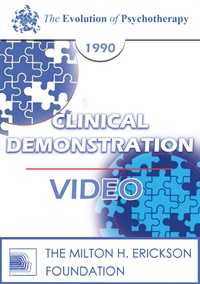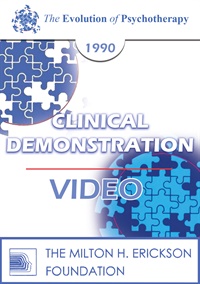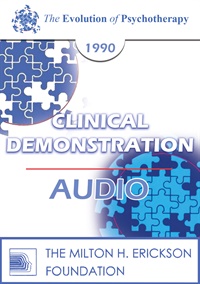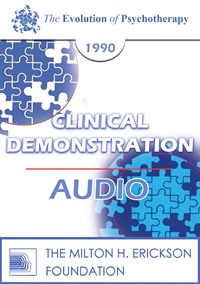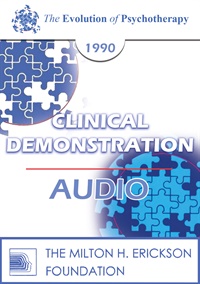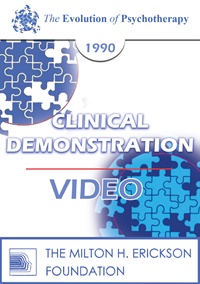Evolution of Psychotherapy 1990
Held December 12-16, 1990 in Anaheim, CA
In 1985, The Milton H. Erickson Foundation sponsored the first Evolution of Psychotherapy Conference. Professionals from around the globe met in Phoenix, Ariz., for what was to become a landmark conference. Leaders in the field convened - many met for the first time. The result was important in developing concilience among schools of thought. Now, five years later, the movement continues.
Advancing into the 21st Century, psychotherapists look to the future. And in Anaheim, important contributors will distill and transmit a cornucopia of experience to shape the evolution of psychotherapy. The Conference theme is "PsycheScapes: Positions and Projections'' through which the presenters can survey the "landscape" of their discipline. They will review and anticipate developments in the field of psychotherapy.
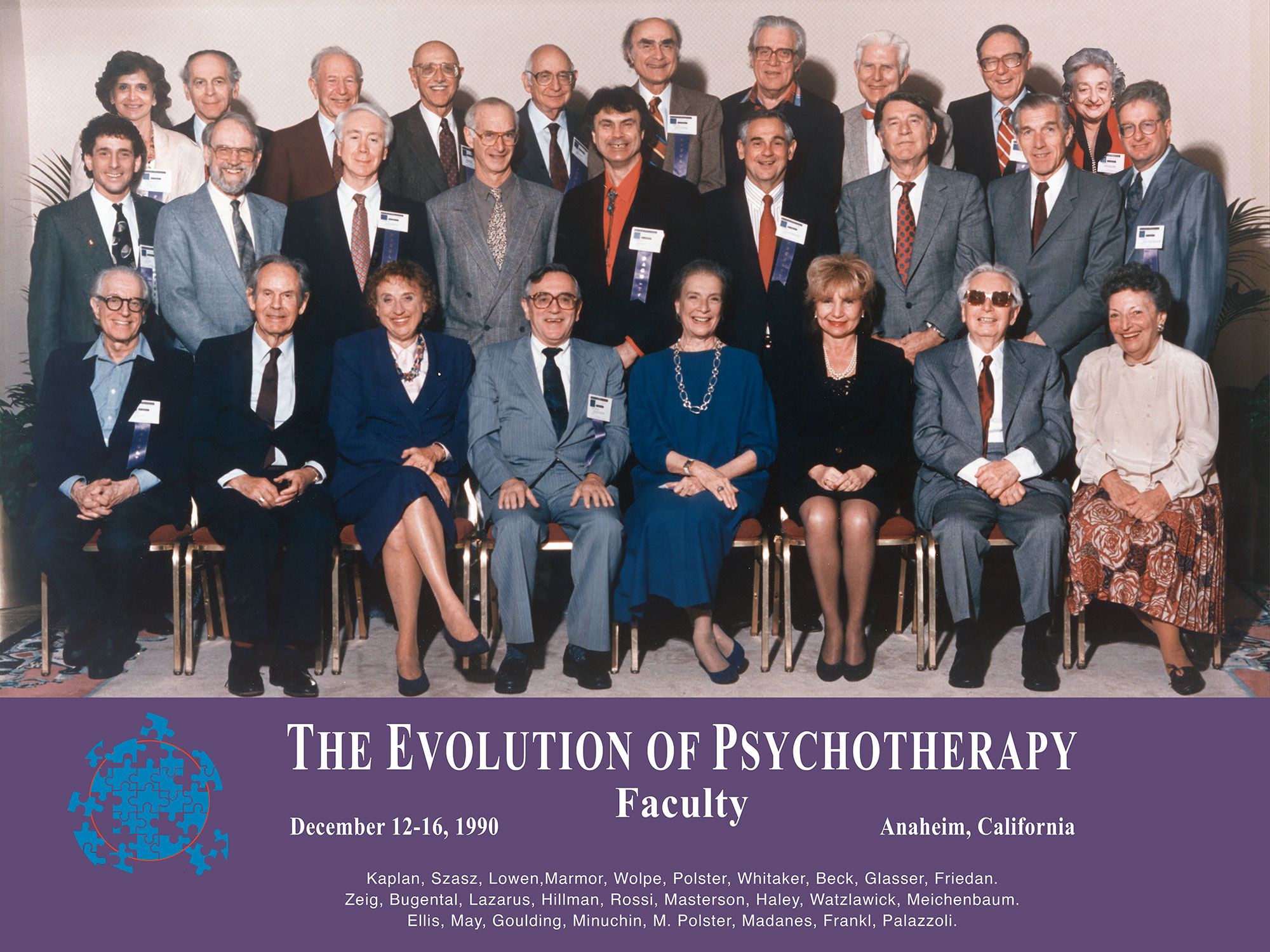
Faculty
- Aaron Beck, MD
- James Bugental, PhD
- Albert Ellis, PhD
- William Glasser, MD
- Mary Goulding, MSW
- Jay Haley, MA
- James Hillman, PhD
- Helen Singer Kaplan, MD, PhD
- Arnold Lazarus, PhD
- Alexander Lowen, MD
- Cloe Madanes, HDL, LIC
- Judd Marmor, MD
- James F. Masterson, MD
- Rollo May, PhD
- Donald Meichenbaum, PhD
- Salvador Minuchin, MD
- Mara Selvini Palazzoli, MD
- Erving Polster, PhD
- Miriam Polster, PhD
- Ernest Rossi, PhD
- Thomas Szasz, MD
- Paul Watzlawick, PhD
- Carl Whitaker, MD
- Joseph Wolpe, MD
- Jeffrey Zeig, PhD
All Evolution of Psychotherapy 1990 Recordings
Below is a listing of all our recordings from the 1990 Evolution of Psychotherapy.
- Average Rating:
- Not yet rated
- Topic Areas:
- Clinical Presentations | Mind-Body | Pain and Healing | Psychotherapy | Stress
- Categories:
- Evolution of Psychotherapy | Evolution of Psychotherapy 1990
- Faculty:
- Ernest Rossi, PhD
- Duration:
- 57:11
- Format:
- Audio and Video
- Original Program Date:
- Dec 12, 1990
- Short Description:
- Clinical Presentation 03 from the Evolution of Psychotherapy 1990 - The Ultradian Healing Response: Mind-Body Healing in Every Day Life, featuring Ernest Rossi, PhD.
- Price:
- $29.00 - Sale Base Price - $59.00
- Average Rating:
- Not yet rated
- Topic Areas:
- Clinical Presentations | Psychotherapy
- Categories:
- Evolution of Psychotherapy | Evolution of Psychotherapy 1990
- Faculty:
- Alexander Lowen, MD
- Duration:
- 55:19
- Format:
- Audio and Video
- Original Program Date:
- Dec 12, 1990
- Short Description:
- Clinical Presentation 04 from the Evolution of Psychotherapy 1990 - Mobilizing Assertiveness, featuring Alexander Lowen, MD.
- Price:
- $29.00 - Sale Base Price - $59.00
- Average Rating:
- Not yet rated
- Topic Areas:
- Clinical Presentations | Children and Adolescent Therapy | Psychotherapy | Reality Therapy
- Categories:
- Evolution of Psychotherapy | Evolution of Psychotherapy 1990
- Faculty:
- William Glasser, MD
- Duration:
- 1 Hour
- Format:
- Audio Only
- Original Program Date:
- Dec 12, 1990
- Short Description:
- Clinical Presentation 05 from the Evolution of Psychotherapy 1990 - Psychotherapy with an Adult or Adolescent Child, featuring William Glasser, MD.
- Price:
- $15.00 - Base Price
- Average Rating:
- Not yet rated
- Topic Areas:
- Clinical Presentations | Rational Emotive Behavior Therapy (REBT) | Psychotherapy
- Categories:
- Evolution of Psychotherapy | Evolution of Psychotherapy 1990
- Faculty:
- Albert Ellis, PhD
- Duration:
- 1 Hour
- Format:
- Audio Only
- Original Program Date:
- Dec 13, 1990
- Short Description:
- Educational Objectives: To be able to describe some of the main techniques of Rational-Emotive Therapy To be able to experiment with the use of some of these techniques
- Price:
- $15.00 - Base Price
Tags: Psychotherapy REBT Albert Ellis
- Average Rating:
- Not yet rated
- Topic Areas:
- Clinical Presentations | Psychotherapy | Supervision | Transference / Countertransference | Brief Therapy
- Categories:
- Evolution of Psychotherapy | Evolution of Psychotherapy 1990
- Faculty:
- Judd Marmor
- Duration:
- 56 Minutes
- Format:
- Audio Only
- Original Program Date:
- Dec 13, 1990
- Short Description:
- Educational Objectives: To demonstrate the importance of defining the focal conflict To demonstrate the importance of the transference-countertransference interaction.
- Price:
- $15.00 - Base Price
- Average Rating:
- Not yet rated
- Topic Areas:
- Clinical Presentations | Resistance | Psychotherapy | Therapeutic Relationship
- Categories:
- Evolution of Psychotherapy | Evolution of Psychotherapy 1990
- Faculty:
- James Bugental, PhD
- Duration:
- 1:00:53
- Format:
- Audio and Video
- Original Program Date:
- Dec 13, 1990
- Short Description:
- When therapy goes well, it is not because the therapist has the answer. In this candid conference presentation, a depth-oriented clinician demonstrates how change emerges when clients are supported in sustained self-exploration. Through live work and clinical reflection, he illustrates how attention to presence, resistance, nonverbal cues, and the subtle dance of transference and countertransference can deepen awareness and free clients to use capacities that were there all along.
- Price:
- $59.00 - Base Price


